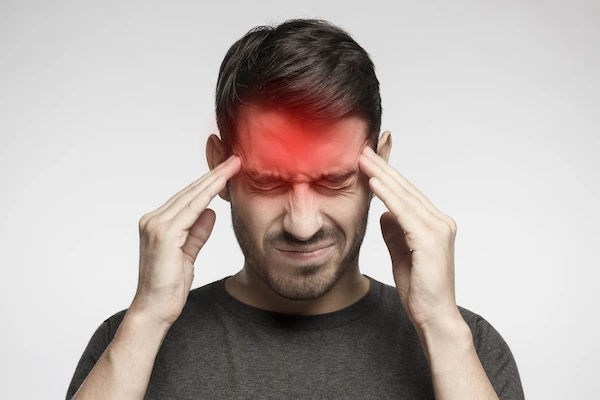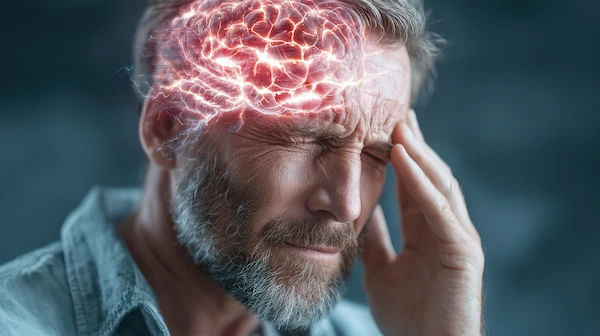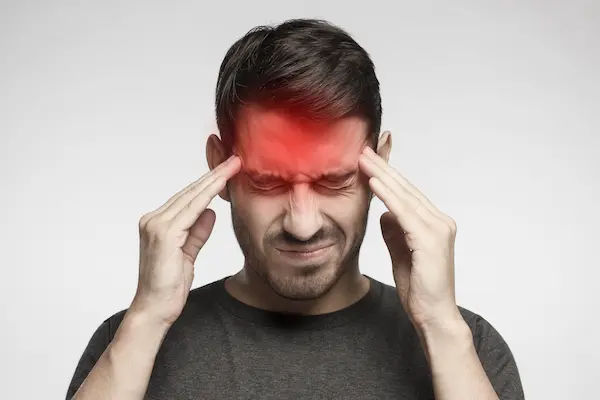Migraine Stages And Ways To Manage
Discover the different stages of a migraine, from early warning signs to post-attack recovery. Learn effective management strategies to prevent triggers, relieve pain, and improve daily life.

Written by Dr. M L Ezhilarasan
Reviewed by Dr. D Bhanu Prakash MBBS, AFIH, Advanced certificate in critical care medicine, Fellowship in critical care medicine
Last updated on 13th Jan, 2026

Introduction
Migraines are far more than just bad headaches. They are a complex neurological condition characterised by a cascade of symptoms that can unfold over several days. For millions, understanding the distinct migraine stages is the first step toward regaining control. This journey often begins with subtle warnings, may involve disruptive sensory changes, peaks with debilitating pain, and ends with a draining "hangover" effect. By learning to recognise each phase—prodrome, aura, headache, and postdrome—you can implement targeted strategies to potentially lessen the severity or even stop an attack in its tracks. This guide will walk you through each stage in detail, offering practical ways to manage symptoms and reduce the overall impact of migraines on your life. Let's demystify the process and empower you with knowledge.
What Exactly is a Migraine?
A migraine is a primary headache disorder involving recurrent attacks of moderate to severe throbbing pain, typically on one side of the head. It's a genetic and neurological condition that affects how the brain processes sensory information. Attacks are often accompanied by nausea, vomiting, and extreme sensitivity to light (photophobia) and sound (phonophobia).
Migraine vs. Headache: Knowing the Difference
While often used interchangeably, migraines and common tension headaches are distinct.
Tension Headaches: Usually cause a constant, dull, squeezing pain on both sides of the head. They are not typically worsened by activity and are rarely accompanied by nausea or sensory disturbances.
Migraines: Feature a throbbing or pulsating pain, often unilateral. They are frequently disabling, worsened by physical activity, and come with a suite of other neurological and gastrointestinal symptoms that unfold in predictable stages.
Consult a General Physician for the best advice
The Four Stages of a Migraine Attack
Not everyone experiences all four phases, and each attack can be unique. However, recognising the pattern is key to proactive management.
Stage 1: The Prodrome (The Warning Phase)
Occurring hours or even days before the headache, the prodrome stage offers a critical window for early intervention. Up to 60% of migraineurs experience these subtle warning signs.
Common Prodrome Symptoms:
- Mood changes (euphoria, depression, irritability)
- Food cravings, especially for sweets
- Neck stiffness or muscle tension
- Increased yawning and fatigue
- Fluid retention and increased urination
- Difficulty concentrating
How to Manage the Prodrome Stage:
This is your best chance to stop a migraine from fully developing. If you recognise these signs:
- Hydrate: Drink plenty of water.
- Avoid Known Triggers: Steer clear of foods, stress, or missed meals that you know can trigger an attack.
- Consider Medication: Some people find taking their abortive medication (like a triptan or NSAID) at this stage can prevent the headache entirely or reduce its severity. It's best to discuss this strategy with your doctor.
- Practice Relaxation: Engage in gentle yoga, meditation, or rest in a quiet, dark room.
Stage 2: The Aura (The Sensory Phase)
About 25-30% of migraine sufferers experience aura, which usually occurs shortly before or during the headache phase. Aura symptoms develop gradually over several minutes and last less than an hour.
Common Aura Symptoms:
- Visual Disturbances: Most common. Includes seeing flashing lights, zigzag lines, blind spots (scotomas), or shimmering areas.
- Sensory Symptoms: Numbness or a "pins and needles" sensation that starts in one hand and travels up the arm to the face.
- Speech/Language Problems: Difficulty finding words or slurred speech (aphasia).
- Motor Weakness: Rare, but can involve weakness on one side of the body (hemiplegic migraine).
How to Manage the Aura Stage:
- Stay Calm: While the symptoms can be frightening, remember they are temporary and typically resolve within an hour.
- Stop Activity: If you are driving, operating machinery, or doing anything potentially dangerous, stop immediately and ensure you are in a safe place.
- Prepare: Use this time to take your medication, get to a quiet, dark environment, and inform someone you trust that a migraine is coming.
Stage 3: The Headache (The Attack Phase)
This is the most acute and debilitating phase, lasting from 4 to 72 hours if untreated. The pain is often unilateral and throbbing, exacerbated by physical activity.
Common Headache Phase Symptoms:
- Intense, pulsating headache pain
- Nausea and vomiting
- Extreme sensitivity to light, sound, and sometimes smells
- Blurred vision
- Lightheadedness and dizziness
How to Manage the Headache Stage:
- Medicate Early: Take prescribed abortive medications as soon as the pain begins for maximum efficacy.
- Sensory Deprivation: Rest in a dark, silent, and cool room. Use an eye mask or blackout curtains.
Temperature Therapy: Apply a cold compress or ice pack to your forehead, temples, or the back of your neck. Some people find a warm compress more comforting. - Hydrate: Sip small amounts of water to prevent dehydration, especially if you have vomited.
Caffeine: A small amount of caffeine (e.g., a cup of coffee) can sometimes enhance the effect of pain relievers, but overuse can lead to rebound headaches.
Stage 4: The Postdrome (The "Migraine Hangover")
The migraine hangover affects nearly 80% of sufferers and can last for a day or two after the headache subsides. You may feel drained and washed out, though some people report feeling mildly euphoric.
Common Postdrome Symptoms:
- Fatigue, exhaustion, and body aches
- Difficulty concentrating and "brain fog"
- Moodiness
- Residual sensitivity to light and sound
- Dizziness
How to Manage the Postdrome Stage:
- Rest: Don't jump back into your normal routine too quickly. Your body and brain need time to recover.
- Rehydrate and Refuel: Drink water and eat balanced, gentle meals to restore your energy and electrolyte levels.
- Gentle Movement: A short, gentle walk outdoors can help combat fatigue and improve mood, but avoid strenuous exercise.
- Be Kind to Yourself: Understand that your productivity might be lower. Prioritise tasks and avoid making important decisions during this recovery period.
Proactive Ways to Manage and Reduce Migraine Frequency
Beyond managing individual attacks, long-term migraine prevention is crucial for improving quality of life.
Identify and Avoid Your Personal Triggers
Keep a detailed migraine diary for at least a month. Note the date and time of the attack, symptoms, potential triggers (food, stress, sleep, weather, hormonal changes), and medications taken. This can reveal powerful patterns.
Lifestyle Modifications for Migraine Prevention
- Sleep: Maintain a consistent sleep schedule, even on weekends.
- Diet: Eat regular meals to avoid low blood sugar. Limit common dietary triggers like aged cheeses, processed meats, alcohol (especially red wine), and MSG.
- Hydration: Drink water consistently throughout the day.
- Exercise: Engage in regular, moderate aerobic exercise like swimming, cycling, or brisk walking to reduce stress and frequency.
- Stress Management: Incorporate daily relaxation practices such as mindfulness meditation, deep breathing exercises, or biofeedback.
When to Consider Preventive Medications
If you have frequent or severely disabling migraines (e.g., more than 4 per month), talk to your doctor about preventive treatment. Options include:
- Blood pressure medications (beta-blockers, calcium channel blockers)
- Antidepressants
- Anti-seizure drugs
- CGRP monoclonal antibodies (a newer class of drugs specifically designed for migraine prevention)
If your condition does not improve after trying these lifestyle methods, consult a doctor online with Apollo24|7 to discuss if preventive medication is right for you.
Conclusion
Understanding the intricate stages of a migraine transforms it from a mysterious and debilitating event into a manageable process. By learning to identify the subtle warnings of the prodrome, respecting the signals of an aura, effectively treating the acute headache, and allowing yourself to recover fully during the postdrome, you can significantly reduce the impact migraines have on your life. Empowerment comes from knowledge and a proactive plan. Combine self-awareness with healthy lifestyle habits and, when necessary, guidance from a healthcare professional. Remember, you are not just a passive victim of migraine pain; you can become an active manager of your neurological health. If you struggle to identify your triggers or find your current management plan ineffective, booking a physical visit to a doctor with Apollo24|7 can provide a personalised path forward.
Consult a General Physician for the best advice
Consult a General Physician for the best advice

Dr. Vivek D
General Physician
4 Years • MBBS
Bengaluru
PRESTIGE SHANTHINIKETAN - SOCIETY CLINIC, Bengaluru

Dr Syed Mateen Pasha
General Physician
2 Years • MBBS
Bengaluru
PRESTIGE SHANTHINIKETAN - SOCIETY CLINIC, Bengaluru

Dr Aakash Andgi
General Physician/ Internal Medicine Specialist
9 Years • MBBS MD
Bengaluru
Apollo Clinic, JP nagar, Bengaluru

Dr. Anand Ravi
General Physician
2 Years • MBBS
Bengaluru
PRESTIGE SHANTHINIKETAN - SOCIETY CLINIC, Bengaluru

Dr. Harshendra Jaiswal
General Physician/ Internal Medicine Specialist
12 Years • MBBS , MD (General medicine)
Kolkata
108 DHANA DHANVANTARI Clinic, Kolkata
(25+ Patients)
Consult a General Physician for the best advice

Dr. Vivek D
General Physician
4 Years • MBBS
Bengaluru
PRESTIGE SHANTHINIKETAN - SOCIETY CLINIC, Bengaluru

Dr Syed Mateen Pasha
General Physician
2 Years • MBBS
Bengaluru
PRESTIGE SHANTHINIKETAN - SOCIETY CLINIC, Bengaluru

Dr Aakash Andgi
General Physician/ Internal Medicine Specialist
9 Years • MBBS MD
Bengaluru
Apollo Clinic, JP nagar, Bengaluru

Dr. Anand Ravi
General Physician
2 Years • MBBS
Bengaluru
PRESTIGE SHANTHINIKETAN - SOCIETY CLINIC, Bengaluru

Dr. Harshendra Jaiswal
General Physician/ Internal Medicine Specialist
12 Years • MBBS , MD (General medicine)
Kolkata
108 DHANA DHANVANTARI Clinic, Kolkata
(25+ Patients)
More articles from Migraine
Frequently Asked Questions
Can you have a migraine without a headache?
Yes, this is known as a 'silent migraine' or migraine aura without headache. A person experiences the aura symptoms (visual disturbances, numbness, etc.) but never develops the actual head pain.
What are the most common dietary triggers for migraines?
Common culprits include aged cheeses, processed meats (containing nitrates), artificial sweeteners (aspartame), monosodium glutamate (MSG), alcohol (particularly red wine), and excessive caffeine or caffeine withdrawal.
How long does a typical migraine attack last?
The entire migraine cycle, from prodrome to postdrome, can last from a few hours to several days. The acute headache phase itself typically lasts between 4 and 72 hours if left untreated.
When should I go to the ER for a migraine?
Seek immediate medical attention if your headache is 'the worst of your life,' comes on suddenly ('thunderclap headache'), is accompanied by a high fever, stiff neck, confusion, seizures, or double vision, or follows a head injury.
Are migraines hereditary?
Yes, there is a strong genetic component. If one or both of your parents have migraines, you have a significantly higher risk of developing them as well.




